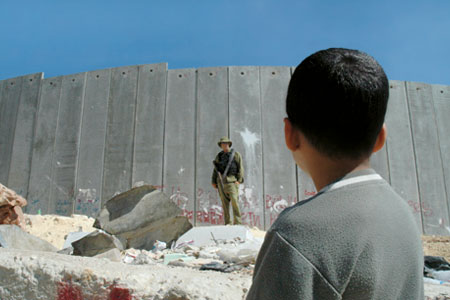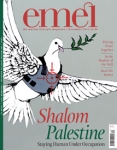
In the Shadow of the Wall
Issue 87 December 2011
The Wall, separating Israelis from Palestinians, is probably the most controversial construction this century. Mark Thomas walked along both sides and describes to emel the impact on people’s lives.
“It is a totem of Israeli oppression; a symbol of Israeli dominance over Palestinian life in all its forms,” declares comedian Mark Thomas about the Wall. But, “the remarkable thing about barriers is that they are doomed to fail.” From the Great Walls of Jericho to the Berlin Wall, they have all come tumbling down. The partition barrier that separates the Occupied Palestinian Territories from Israel stands, for Thomas, as a giant monument to failure, “A barrier is failure in bricks and mortar. It says: talks and politics, negotiations and dialogue, the normal comprehensions of human interactions, have failed. The Wall is failure and it is Israel’s failure.”
The Wall in Palestine/Israel is actually a concentric series of concrete, razor wire, electrified fences, trenches, and watchtowers flanked by a 30 to 75 metre “buffer zone” which the Israeli military patrols. At over double the height and around four times the length of the Berlin Wall, the security fence, as its proponents like to call it, is definitely no garden structure to chat over with the neighbours. For its detractors, it is an Apartheid Wall that seeks to separate people on racial grounds. The International Court of Justice has declared it illegal; it impedes the liberty of movement, the rights to work, to health, to education and to an adequate standard of living for Palestinians in the Occupied Territories. The Court recommended that the UN should “bring to an end the illegal situation resulting from the construction of the Wall and the associated regime.”
The semantics of whether it is a security fence or an Apartheid Wall seem to annoy Thomas. He is not a PC-type of guy, although there is an issue with vocabulary, “Some Israelis won’t even say ‘West Bank’. They say Judea and Samaria. I’ve been brought up hearing the propaganda that the majority of Palestinians don’t recognise Israel, but I found the reverse to be true. The majority of Israelis that I met didn’t recognise Palestine.”
The reason given by Israel for the Wall was their fear of suicide bombings. Indeed, Israel’s security cabinet approved the barrier’s first three segments in 2002, the year when 55 Palestinian suicide attacks killed 220 Israelis. Since the Wall was constructed, the numbers of bombings have significantly decreased. Thomas recognises the “very real fear” of the bombers, and that “those attacks were brutal and violent and disgusting.” He does not think, however, that the Wall will stop those determined to bomb. This year, a bomb went off in Jerusalem, killing a British tourist, and “no one seemed to notice that actually the Wall didn’t stop that.”
Get your digital copy of emel today. With exclusive videos, behind the scenes footage, animation, and much more, the digital edition is the perfect way to read your favourite magazine whenever and wherever you want. Get your digital edition now!
Mark Thomas recounts his extraordinary walk along the Wall in his book, ‘Extreme Ramblings: Walking Israel’s Separation Barrier. For Fun’ published by Ebury Press.
Bookmark this |
|
Add to DIGG |
|
Add to del.icio.us |
|
Stumble this |
|
Share on Facebook |
|
Share this |
|
Send to a Friend |
|
Link to this |
|
Printer Friendly |
|
Print in plain text |
|


Comments
1 Comment
1
22 Dec 11, 04:54
I added the bookmark to your site. I think we will meet a longer period of time.